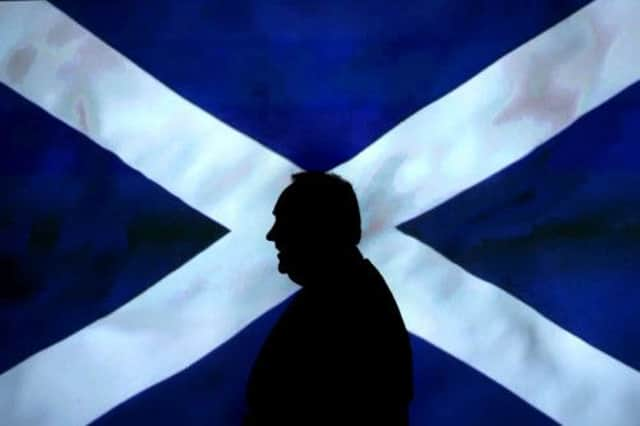Leaders: Salmond wise to view oil as a bonus


Now voters have two estimates, both from authoritative sources, but which vary widely in their projections of likely oil and gas production. The Office for Budget Responsibility, which is independent of government but based its figures on work done by the Department of Energy and Climate Change, reckons that about ten billion barrels, equivalent to about a quarter of what has come out since production began 38 years ago, will flow over the next 27 years.
Alex Kemp, professor of petroleum economics at Aberdeen University, and the foremost independent authority on the North Sea, thinks this is too low and that perhaps as much as 17 billion barrels will be extracted over the next 30 years, with a central estimate of 13.5 billion barrels.
Advertisement
Hide AdAdvertisement
Hide AdThe difference sounds big, but given the time span of the predictions, the annual difference in forecast production each year is not great. And given the big uncertainties that affect oil prices, a main determinant of production rates and also, obviously, of oil company profits and the tax revenue that can be obtained from them, the average voter could quite reasonably conclude that the debate has not been greatly advanced by these predictions.
Nevertheless, oil price volatility and the high variability in annual tax revenues has been a significant problem for the advocates of independence. It seems now that Alex Salmond is moving to deal with this problem by arguing, alongside a Scottish Government paper on North Sea oil to be published today, that oil and its tax wealth should be regarded as a bonus and not as essential to an independent Scotland’s economic and fiscal health.
While this is an interesting political move to defuse an argument by his opponents which has been troubling the independence campaign, it is also an economically sensible move.
No plan for what the public finances of an independent Scotland might look like would be regarded as credible if it entailed committing all oil revenues to current spending on areas like health and education. That is because of the volatility of revenues, which has seen them drop by as much as £5 billion from one year to the next in recent years.
As Mr Salmond’s fiscal commission has advised, oil revenues can be sensibly used to build up a sovereign wealth fund. This, however, creates problems in another respect – how to balance Scotland’s finances when current expenditure inside the UK looks to be more than can be financed from non-oil taxes. Achieving that balance without severe cuts in spending or increases in taxes is a difficult issue which will strain Mr Salmond’s advisers’ abilities to the limit.
A toast to the new prince
At LAST, after a long, long, day of waiting, the Duchess of Cambridge has given birth to a baby boy. Every mother knows the anticipation of birth, the inevitable pain of delivery, and finally the elation and pure joy of holding a child, a new life, in her arms.
Every father too will know the different agonies endured by the Duke of Cambridge, the pacing, the waiting, the inability to share and ease the act of childbirth, and all the worries about what might go wrong. But he too will have experienced the marvel that suddenly his immediate family has grown to three members. This private agony and ecstasy has been followed by hundreds, if not thousands, of reporters, cameramen, and photographers outside St Mary’s Hospital London, and by millions of people, perhaps billions, across the world via television and radio.
That this otherwise commonplace act of childbirth has attracted so much attention is of course because this little boy is already a prince and is third in line to the British throne. And much though debate flows about the value and place of the monarchy in modern society – and that debate is healthy in a democracy – the attention paid is testament to how much the monarchy is still cherished by the people of Britain, and an object of admiration and wonderment globally.
Advertisement
Hide AdAdvertisement
Hide AdNow the guessing game of the name the Duke and Duchess will give their son begins. For our part, we think James, in recognition of the six Scottish (and one British) kings of that name would be entirely appropriate. But in the meantime, along with our readers, we simply wish the royal couple and their son what we would wish any new parents: the very best of health.